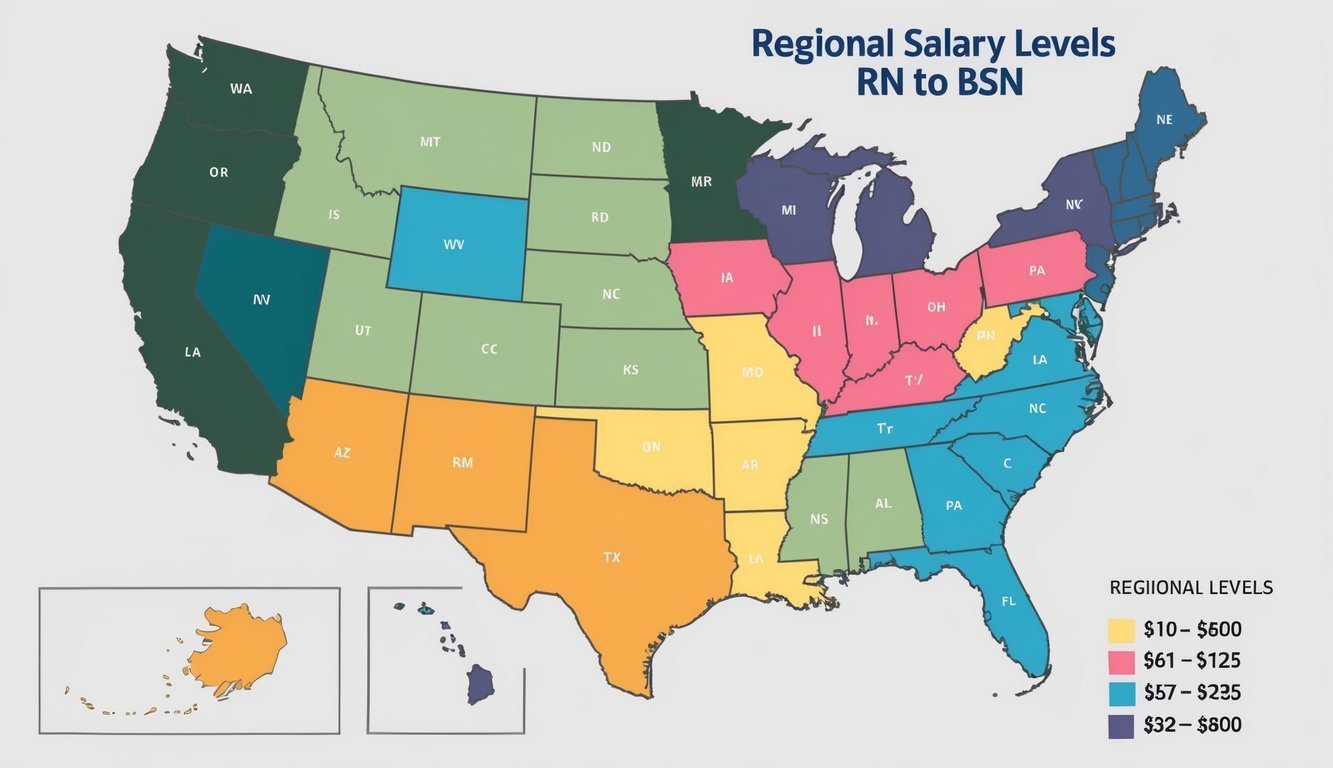In the ever-evolving field of nursing, advancing your education can significantly impact your salary.
A BSN degree holder earns around $92,560 on average, compared to $80,660 for those without a bachelor’s degree.
This difference reflects the added responsibilities and specialized knowledge that come with a BSN, making it a key consideration for anyone in the nursing profession.
As you consider enrolling in an RN-to-BSN program, it’s important to understand how this educational upgrade can enhance your career opportunities.
Many employers prefer or even require a BSN for certain roles, leading to a more competitive edge in the job market.
Regional salary variations also play a role, with some states offering much higher wages for BSN-prepared nurses.
Investing in your education by pursuing a BSN not only improves your earning potential but also contributes to addressing the nursing shortage.
With a BSN, you position yourself better for roles in leadership and specialized areas, paving the way for long-term career growth.
Key Takeaways
- A BSN can lead to a significant salary increase compared to an ADN.
- Higher education opens up more job opportunities in nursing.
- Region and demand impact salary levels for BSN nurses.
Understanding RN-to-BSN Programs

RN-to-BSN programs help registered nurses with an Associate Degree in Nursing (ADN) or diploma advance their education to a Bachelor of Science in Nursing (BSN).
These programs combine various elements of nursing theory, research, and practical application to prepare you for higher-level roles in healthcare.
Program Overview
RN-to-BSN programs typically require you to have your RN license before enrollment.
They build on your existing nursing knowledge and skills while adding essential coursework.
Most programs include subjects such as healthcare policy, nursing research, and ethics.
You may find that programs are offered both in-person and online.
Online nursing programs can offer the flexibility and convenience you need.
Coursework often culminates in a capstone project where you apply what you’ve learned in a real-world setting.
Benefits of Advancing Education
Advancing your education through an RN-to-BSN program can significantly impact your career.
Nurses with a BSN often qualify for higher-paying positions and more job opportunities.
For example, BSN-prepared nurses earn an average of about $20,000 more than RNs with only an ADN.
Additionally, many healthcare facilities prefer or require nurses to have a BSN.
This preference is due to the increased complexity of patient care.
By earning your BSN, you position yourself as a more competitive applicant in the job market.
Online Nursing Programs and Flexibility
Online nursing programs provide flexibility, making them a great choice for working nurses.
With these programs, you can often set your own schedule and study at your own pace.
This adaptability allows you to balance work, education, and personal responsibilities more effectively.
Many RN-to-BSN programs feature asynchronous classes, so you can access lectures and assignments anytime.
This flexibility helps you maintain your job while you continue your education.
Consider researching various online options to find a program that meets your needs, such as those listed on Nurse.org or RN Careers.
RN and BSN Salary Overview
Understanding the salary differences for Registered Nurses (RN) and those with a Bachelor of Science in Nursing (BSN) can help you make informed career choices.
The following sections discuss average salaries, key comparisons, and insights into how your degree impacts earnings.
Average RN Salary
The average salary for Registered Nurses varies based on education and experience.
As of 2024, the average annual salary for RNs is approximately $80,660.
This figure translates to about $38.79 per hour.
Factors influencing RN salaries include location, years of experience, and the type of healthcare facility.
For example:
| State | Average RN Salary |
|---|---|
| California | $109,420 |
| Texas | $75,000 |
| New York | $92,000 |
These salaries display significant variation depending on geographical context.
Registered Nurse Salary
Registered Nurses may earn different amounts based on their qualifications.
The Associates Degree in Nursing (ADN) prepares you for entry-level RN roles.
RNs with an ADN earn a baseline salary of around $80,660.
In many cases, RNs also receive benefits that can add value to their total compensation.
These often include health insurance, retirement plans, and paid time off.
It’s essential to factor these into your total earnings picture when assessing your nursing career.
Average BSN Salary
Holding a Bachelor of Science in Nursing (BSN) can significantly impact your earning potential.
The average salary for BSN-prepared nurses is about $92,560 annually, which is a substantial increase compared to those with only an ADN.
This difference can amount to approximately $11,900 more per year, equating to about a 14.75% increase in salary.
| Degree Type | Average Annual Salary |
|---|---|
| ADN | $80,660 |
| BSN | $92,560 |
The higher education level can lead to more job opportunities and specialized roles.
RN vs BSN Salary
The salary comparison between RNs with an ADN and those with a BSN is crucial for career planning.
RNs typically earn less than BSN nurses.
By choosing to pursue your BSN, you might qualify for higher-paying positions that require more specialized training.
For instance, BSN nurses may be able to step into roles in management, education, or specialized nursing areas.
Additionally, over a nursing career, the difference in lifetime earnings becomes substantial.
RNs can expect lifetime earnings below $2 million, while BSN nurses often exceed $2.5 million by retirement age.
Career Outlook and Job Opportunities

The nursing profession is expected to grow significantly in the coming years.
With rising demand for healthcare services, job opportunities for RNs with a BSN will be plentiful.
Here are key insights into the career outlook and job opportunities in this field.
U.S. Bureau of Labor Statistics Data
According to the U.S. Bureau of Labor Statistics, the median annual wage for registered nurses was $86,070 as of May 2023.
This figure reflects a mix of education levels, including both ADN and BSN nurses.
As you pursue a BSN, you may find better pay opportunities, especially in competitive markets.
The job outlook for registered nurses is promising.
The employment of RNs is projected to grow by 6% from 2021 to 2031, adding about 195,000 new jobs each year.
This growth is driven by increasing health care needs and an aging population.
Aging Population Effect
The aging population plays a significant role in the demand for nursing professionals.
As the baby boomer generation ages, the need for healthcare services rises.
Older adults typically require more medical attention, leading to a higher demand for registered nurses.
This shift creates job openings in various settings, including hospitals, nursing homes, and home health agencies.
Moreover, nursing specialties that focus on geriatric care are likely to see significant growth.
Annual Job Openings Statistics
Each year, there are approximately 200,000 job openings for RNs due to both new positions and replacements.
This includes retiring nurses leaving the workforce.
The turnover rate in healthcare can be high.
Thus, there is a constant need for trained professionals.
Regions with larger aging populations may have even higher demand for nurses.
Be aware of state trends when considering job opportunities.
States like California and Texas often have more job openings than others due to their larger populations.
Career Advancement Possibilities
Earning a BSN can open doors for career advancement.
Many healthcare facilities prefer or require a BSN for higher-level positions.
This degree can lead to roles such as Nurse Manager, Nurse Educator, or Nurse Practitioner.
Additionally, specialized certifications and advanced degrees can further boost your career.
As you advance, you may also see an increase in salary.
Positions in specialized areas such as critical care or pediatrics may offer even higher pay and additional opportunities.
Regional Salary Variations

Pay for registered nurses with a Bachelor of Science in Nursing (BSN) can vary significantly based on region and industry.
Understanding these differences can help you make informed career decisions.
Salary by State
Different states offer varying salaries for BSN nurses.
For example, California tends to pay higher than most states.
Here are some average annual salaries:
| State | Average Annual Salary |
|---|---|
| California | $120,000 |
| New York | $90,000 |
| Texas | $85,000 |
| Florida | $78,000 |
| South Dakota | $60,000 |
The cost of living and demand for nurses also play crucial roles in these figures.
In high-demand areas, you not only find better salary offers but also more job opportunities.
For more details, check out Glassdoor’s listings for the most up-to-date numbers.
Salary by Industry
The industry in which you work also affects salary.
Hospitals generally offer higher salaries compared to clinics or educational institutions.
Here’s a look at average salaries in different sectors:
| Industry | Average Annual Salary |
|---|---|
| Hospitals | $95,000 |
| Home Health Care | $80,000 |
| Outpatient Care Centers | $75,000 |
Specialization can influence income as well.
For example, Nurse Practitioners or Nurse Anesthetists earn significantly more than the average RN.
You can explore more about these roles and salaries through various resources to find the best fit for your career path.
Bridging the Nursing Shortage Gap
Addressing the nursing shortage is vital for improving healthcare outcomes.
By focusing on education and the paths to advanced degrees, you can better understand how to help fill this gap.
Education Impact on Nursing Shortages
The transition from an Associate Degree in Nursing (ADN) to a Bachelor of Science in Nursing (BSN) can significantly impact the nursing workforce.
Research shows that BSN-prepared nurses contribute to better patient outcomes.
As noted, hospitals often prefer nurses with bachelor’s degrees due to their advanced training in critical care and leadership skills.
Many institutions offer RN-to-BSN programs designed for current registered nurses.
These programs aim to provide the necessary education to meet the growing demand for more qualified professionals in the field.
The Institute of Medicine recommends that 80% of nurses hold a baccalaureate degree, which could help alleviate staffing shortages and improve care.
NCLEX and Graduate Degrees
Passing the NCLEX is essential for any registered nurse.
However, pursuing a graduate degree opens doors to more advanced roles.
With a higher level of education, you can access positions in nursing leadership, education, and specialty areas.
Graduate degree holders often enjoy greater job security and salary potential.
For example, a BSN can lead to opportunities in critical care, management, or education roles.
Additionally, some employers offer tuition assistance for continuing education, making furthering your education more accessible.
By bridging educational gaps and pursuing advanced degrees, you can strengthen the nursing workforce and contribute to better healthcare overall.
Frequently Asked Questions
This section addresses common queries related to RN to BSN salary changes, differences in high-demand states, and long-term financial benefits.
You will also learn how BSN qualifications influence salary compared to RNs without a BSN.
What is the average salary increment for an RN obtaining a BSN?
The average salary for RNs with a BSN can increase significantly.
Research shows that RNs can see an annual salary boost of about $11,900 after completing their BSN program.
This increment can make a substantial difference over a career.
How does a BSN qualification impact salary in high-demand states like California and Texas?
In states like California and Texas, having a BSN can lead to higher pay.
For example, California often offers some of the highest salaries for BSN-prepared nurses due to a high demand for skilled healthcare professionals.
Similarly, in Texas, RNs with a BSN can command better wages compared to those with an ADN.
What are the long-term financial benefits of transitioning from RN to BSN?
Transitioning from RN to BSN provides several long-term financial benefits.
Over an entire nursing career, BSN-prepared nurses can earn more than $2.5 million, while RNs without a BSN may earn under $2 million.
This difference can affect your financial security and retirement options.
How does the salary of a BSN-prepared nurse compare to an RN without a BSN?
BSN-prepared nurses typically earn more than those with an ADN.
On average, the salary difference can reach up to $20,000 annually.
These increased earnings can significantly impact your lifestyle and future financial goals.
What are the salary differences between RNs and BSNs on an hourly and monthly basis?
The difference between RN and BSN salaries can be seen both hourly and monthly.
For example, the average hourly pay for a BSN is around $44.50, whereas an ADN RN might earn about $37.70.
Over a month, this gap translates to about $1,200 in additional income for BSN-prepared nurses.
What type of nursing specialties for BSN-prepared nurses offer the highest salaries?
Certain specialties tend to pay better for BSN-prepared nurses.
For instance, Nurse Practitioners and Clinical Nurse Leaders often earn some of the highest salaries in the field.
Additionally, specialties like critical care and emergency nursing can also provide higher financial rewards due to their demanding nature.

